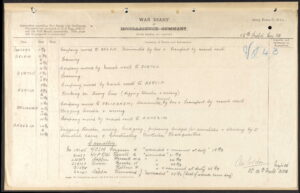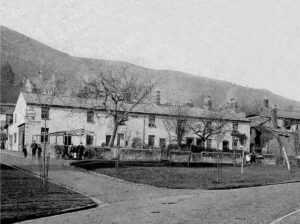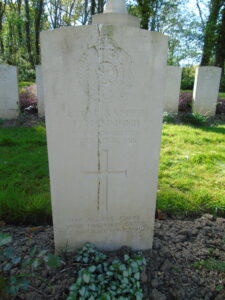Early years
Joseph Hammond was born in West Malvern in 1893, the eldest son of William Hammond a labourer for Malvern Urban District Council and his wife Louisa. He was christened at St Peter’s Church, Cowleigh on 17th September 1893. Around two years later, the family of four children moved to 6 Link Terrace, Link Top (later known as Lygon Terrace).
The 1901 Census found Joseph in the Isolation Hospital off Halfkey Lane, Malvern suffering from scarlet fever. He survived this childhood illness and and ten years later he was an apprentice gas fitter. When war broke out he was employed in the Malvern Urban District Council Electricity Department.
First World War
Joseph joined the Royal Engineers at the beginning of the war, and with his technical skills was quickly posted to France, where there was a shortage of technical troops. He landed in France on 20th November 1914. For much of the war he served with 56th Field Company, part of the regular army, 3rd Division.
Battle of Lys 1918
On the 7th April 1918 German forces opened the second phase of their Spring Offensive, attacking British and Belgian held lines from Ypres in the north to Bethune in the south. Troops were moved in to meet this new attack.
During the month, 56th Field Company moved by stages from the Arras sector to Annezin, west of Bethune. Between 14th and 30th April 1918 the unit was employed digging trenches, wiring, bridging, constructing a battalion headquarters, preparing bridges for demolition and standing by ready to blow up the bridges.
The men of the field company came under shell-fire during these tasks. Six men were wounded in this period; Joseph Hammond was seriously wounded on 29th April and sadly died while being treated at 8th Field Ambulance, Royal Army Medical Corps.

War Diary of 56 Field Company, RE for April 1918, recording Joseph Hammond’s death on 29th April 1918. National Archives WO95/1043/1
Death and burial
Influenza broke out in 8th Field Ambulance on the day that Joseph died and at midday, they were moved back down the line, so it seems likely that he was wounded in the early hours of the morning and died in the morning.
Joseph was buried at Sandpits British Cemetery, Fouquereuil. This cemetery was begun by XIII Corps at the outset of the German advance in April 1918, and continued to used by units including 8th Field Ambulance until September 1918. Post-war the permanent buildings and infrastructure of the cemetery was designed by Sir Edwin Lutyens.
The Malvern News reported his death in May 1918:
“Mr and Mrs W Hammond of 6 Lygon Terrace have received official news of the death of their elder son Spr J Hammond on the 29th April. Before joining the Colours he was employed in the Malvern UDC Electricity Department.”
A double family tragedy
His youngest brother Arthur Hammond was killed in action later in 1918, on 27th September. Their middle brother served in the Royal Field Artillery and survived the war.
1901 Census
1911 Census
Malvern News 18/5/1918
Stevens Annual for 1917: Malvern 1917





